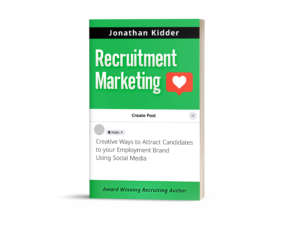
Recruitment marketing plays a crucial role in achieving your hiring objectives. To distinguish yourself from your competitors, it’s essential to allocate time and resources towards developing a strategic recruitment marketing plan. I have put together a comprehensive guide to cover the basics of this topic. Additionally, I have recently released a book called “Recruitment Marketing”, which delves deep into the subject and provides in-depth insights.
What is recruitment marketing?
Recruitment marketing refers to the strategies and tactics that organizations use to attract, engage and retain potential candidates for open job positions. It involves promoting the organization’s brand, culture, and value proposition to attract potential job seekers and to communicate what makes the company a great place to work. Recruitment marketing typically involves a combination of employer branding, inbound recruiting, audience segmentation, social media recruiting, candidate engagement and experience, and recruitment analytics. The goal of recruitment marketing is to create a positive candidate experience and to build a talent pipeline of qualified and engaged candidates who are interested in working for the organization.
The importance of marketing in recruiting and talent sourcing:
Marketing is important in recruiting because it helps organizations to compete for top talent in a crowded and highly competitive job market. In today’s job market, job seekers have more choices than ever before and can easily compare job opportunities from multiple employers. Therefore, organizations need to differentiate themselves and showcase what makes them unique in order to attract the best candidates.
Recruitment marketing helps organizations to achieve this by promoting their brand, culture, and value proposition to potential candidates. This allows organizations to create a positive image and to communicate what sets them apart from other employers. In addition, recruitment marketing helps organizations to build a talent pipeline of qualified and engaged candidates who are interested in working for the organization.
The components of recruitment marketing:
Employer Branding: Defining and communicating an organization’s unique culture and values to potential candidates.
Inbound Recruiting: Creating engaging and informative content to attract candidates to job opportunities. This can include showcasing current employees, highlighting remote or hybrid work policies, maintaining a company blog, and discussing exciting projects.
Audience Segmentation: Identifying and dividing potential candidates based on the needs of the open position. Advertising and content marketing strategies can then be tailored to each specific segment.
Social Media Recruiting: Connecting with and searching for qualified candidates through social networks. Social media can also be used to amplify employer messages.
Candidate Engagement and Experience: Keeping qualified candidates interested, satisfied, and engaged throughout the recruitment process. This can include email campaigns, career newsletters, frequently updated job postings, and open feedback.
Recruitment Analytics: Tracking and analyzing data such as applicant sources, channel-conversion rates, hire rates per source, and employee referral program performance. This provides insight into the success of recruitment marketing strategies and areas for improvement.
The 4 Stages of the recruitment marketing funnel:
Awareness: Candidates become aware of the organization and its job opportunities.
Engagement and Active Search: Candidates engage with the organization and actively search for job opportunities.
Expression of Interest: Candidates express interest in specific job openings.
Application: Candidates submit an application for a job opening.
The recruitment marketing process focuses on the top half of the hiring funnel with the goal of driving candidates further down the pipeline and ultimately to the final stages of the hiring process: screening, interview and evaluation, offer, and hire.
Creating a recruitment marketing plan:
Set Goals: Determine the desired outcomes and targets of the recruitment marketing plan.
Define Roles: Assign responsibilities to team members to ensure the success of the plan.
Establish Target Candidates: Identify the ideal candidates for the open positions.
Identify Recruitment Channels: Determine the best channels to reach target candidates.
Allocate Resources: Assign resources, including budget and personnel, to support the plan.
Create a Content Calendar: Plan the content and messaging for each recruitment channel.
Best practices for recruitment marketing:
Use Organic and Paid Advertising: Identify the social media platforms that target candidates frequent and place organic and paid advertising on those platforms.
Leverage Company-Owned Channels: Utilize the organization’s website, blog, career pages, YouTube channels, and newsletters to market the employer brand and generate candidate interest.
Develop Internal Subject-Matter Experts: Highlight internal experts on topics of interest to targeted candidates to engage and attract them.
Engage Candidates with Email and Newsletters: Create engaging content and offers for job seekers through email and newsletters.
Repurpose Content: Ensure consistency across channels and departments by repurposing content across various formats, such as podcasts, webinars, and videos.
Final Thoughts…
By utilizing effective recruitment marketing strategies, organizations can improve the candidate experience, increase the number of quality applicants, and reduce the time and cost of the hiring process. Overall, recruitment marketing is an essential component of modern-day recruiting and is critical for organizations to attract, engage, and retain top talent.
I wrote a book that goes into more detail on Recruitment Marketing here❤️
(Purchase it on amazon here)
Recommended Reading:
Why talent mapping is crucial for your sourcing success?
How to SEO optimize job descriptions
Top recruiting authors to follow in 2023
- Unlocking the Power of Perplexity AI: Why Recruiters Should Utilize This Revolutionary Tool - February 11, 2024
- Exploring AI Interviewing Assessment Tools: A Comprehensive Review - November 30, 2023
- PartyRock a Sandbox for Talent Sourcing - November 29, 2023

